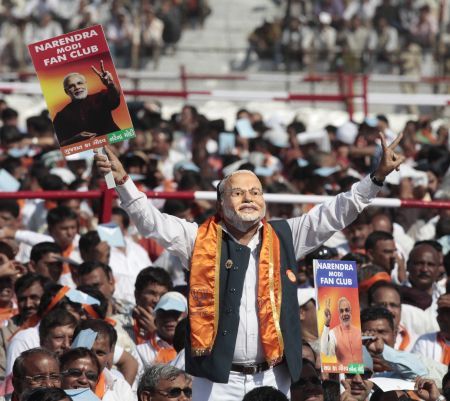'The Congress era was already over anyway! The real question is: Has India opened a new, post-coalition era and I'm very doubtful about that,' Christophe Jaffrelot, author of several books on Indian politics, tells Archana Masih/Rediff.com, analysing Mandate 2014.
 "Modi will not be the kind of Primus Inter Pares (first among equals) Vajpayee was. His style may be more similar to that of Indira Gandhi before the Emergency, this famous 'Era of discipline'..."
"Modi will not be the kind of Primus Inter Pares (first among equals) Vajpayee was. His style may be more similar to that of Indira Gandhi before the Emergency, this famous 'Era of discipline'..."
"The BJP has promised so much that expectations are too high for any government..."
Christophe Jaffrelot, image, below, Researcher at CERI-Sciences Po/CNRS, Professor at the King's India Institute, Princeton Global Scholar and the author of several books on Indian politics, analyses Mandate 2014 in an e-mail interview with Archana Masih/Rediff.com.
Has the 2014 general election exceeded the expectations of the parties and the people? Will it go down in India's history as a landmark election?
It will if this is more than one shot and sets the agenda for years to come, introducing a new style of politics like Indira Gandhi in 1971.
If it does, it will be 'a critical election', as political scientists say. If not, if the BJP loses in 2019 (or before), it will be seen retrospectively as a mere wave -- like in 1977 or 1984.
Would you say that this isn't a vote for anti anti-incumbency, but a vote for Mr Modi and the BJP?
It's both. The Congress had clearly lost its credibility because of the economic slowdown, corruption scams and lack of leadership -- as well as communication skills.
But the BJP was not only supported by default. It has been more cohesive behind a single leader whom almost everybody followed and promoted -- including the RSS (Rashtriya Swayamswevak Sangh) this time -- it has made unprecedented promises -- look at its election manifesto -- it has been more aggressive in terms of communication and it has benefited from more funds -- this is the most expensive elections India had ever had.
Last but not the least, it has cashed in on the communal atmosphere that prevailed in some parts of the country.
Has India voted in anger against the Congress?
Anger, I don't know. But there is some resentment for the reasons mentioned above, plus a fatigue with dynastic politics and the paralysis of the government.
In any case, the anti-incumbency factor was bound to be huge after 10 years. But the way Manmohan Singh has been treated, not only by his opponents from whom you cannot necessarily expect any sense of sophistication, but also in the media, has been unfair if you factor in the fact that all emerging countries are facing economic problems today.
It is not a sufficient excuse, but it should have led the analysts to be more nuanced in their criticisms.
What are some of the first things Narendra Modi will take up as PM? Will he make some grand gesture towards the Muslims?
It depends what you mean by that! He will certainly not adopt offensive measures which would aggravate the communal tensions which have already resulted in so many riots in UP over the last two years.
That would affect his capacity to maintain law and order and would distract him from his priority: The relaunching of the economy. But will he organise an Iftar party like Vajpayee? We'll see this summer.
Facing their worst-ever performance, does it mean the end of the road for the Gandhi dynasty in the Congress?
One must never say never in politics, especially regarding the Congress: The party has bounced back so many times.
It has to fix all the problems I've mentioned above, but it may do it and if the democratic provisions of the Constitution are observed and if the institutions maintaining them are resilient enough -- including the Election Commission -- the Congress could make some good use of the coming years.
After all, the BJP has promised so much that expectations are probably too high for being met by any government.
Will this historic defeat shake up the Congress and perhaps force it to push its younger leaders to the fore? Where does the Congress go from here?
To let the young generation replace the old guard should indeed be the order of the day. This is long overdue. The Congress has many promising young leaders in its ranks. The fact that some of them are sons and daughters of former ministers of Indira or Rajiv does not preclude the fact that they are competent.
 Has the BJP victory proved that it is no longer a Hindu nationalist, right of Centre party, but has been brought into the mainstream by Mr Modi?
Has the BJP victory proved that it is no longer a Hindu nationalist, right of Centre party, but has been brought into the mainstream by Mr Modi?
A party does not join mainstream politics by becoming big, but by representing the diversity of society. We'll have to wait to reach a conclusion there: Is the BJP now attracting Dalits, Adivasis and Muslims?
The profile of its candidates suggests that it has nominated a remarkably small number of Muslim candidates this time -- which is in tune with the under-representation (or no representation) of the minorities among the RSS.
How can a political movement be truly national if it excludes members of some communities?
Does this mark the end of the Congress era and the emergence of a BJP era in Indian politics?
It is too early to say whether a 'BJP era' is emerging. There'll be elections in Bihar next year and then many elections in BJP-governed states where anti-incumbency may again work at the expense of those who were governing the country.
But the Congress era was already over anyway! The real question is: Has India opened a new, post-coalition era and I'm very doubtful about that. After all, the state parties are going to win as many seats as last time...
What are some of the decisions/policies of the UPA government that Mr Modi is likely to overturn or revamp?
I do not think he will undo what has been done for the poor -- or it will be in the form of a discreet dilution or in the name of a better programme. But he will definitely liberalise the economy more -- which may be in tune with the 'business friendliness' the BJP government has shown in Gujarat (and that should not be mistaken for a market economy-oriented policy: Few things have been sold to the big investors at market price).
The business community has probably supported Narendra Modi more than any other prime ministerial candidate this time -- not by chance.
Do you think under Mr Modi the Government of India will see a new working, 'can-do' environment in Delhi?
Definitely. The feeling of paralysis that was prevailing for too many years will be replaced by new forms of activism.
What remains to be seen is whether that will make a difference in terms of development and whom that will benefit.
What changes is the BJP going to see within itself? What role will Mr Modi carve out for the old guard of the party?
It is very difficult to say. Some people will be sidelined, but most of the heavyweights will be accommodated in one way or another -- not only in the government because there are so many positions to fill in a spoils system-like regime.
But Modi will not be the kind of Primus Inter Pares Vajpayee was. His style may be more similar to that of Indira Gandhi before the Emergency, this famous 'Era of discipline'.
Will Mr Modi be India's most authoritarian PM?
It depends on how you define authoritarianism. In Russia, Turkey, Sri Lanka today, authoritarian democrats have been able to win elections and to retain power because they combined populist techniques (including an intense use of the mass media), an ethno-nationalist politics (of fear sometimes) aiming at 'the other' as well as a great proximity with capitalist milieus.
This development has been made possible because of the traditional weaknesses of democratic institutions including the judiciary and the press.
India is supposed to have robust institutions and a free press capable of containing authoritarianism. Whether they will play their role or are reformed remains to be seen.;
What do the election results mean for the political future of the Aam Aadmi Party and Arvind Kejriwal?
They are encouraging. A party that is less than two years old cannot expect to do more in a country where muscle power and money power have played such an important role in politics in some places for so many years.
In fact, the increase of the party's vote share in places like Delhi is remarkable.
Image: Muslim BJP workers celebrate the party's victory in Lucknow on Friday, May 16, 2014. Photograph: Nand Kumar/PTI Photo.








